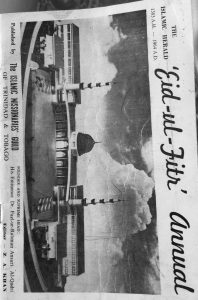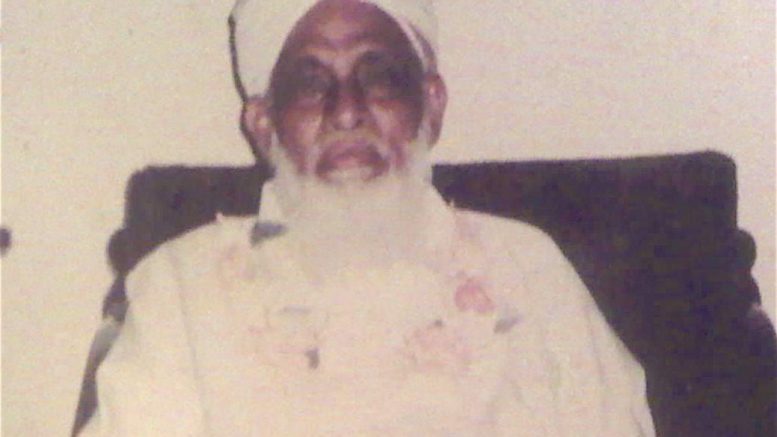Like the first flowers of spring
The blessed month of fasting is looked forward to with great pleasure and eagerness. Like the first flowers of spring, it brings joy, and happiness to millions of souls. It is an annual reminder of the great message of “AL QURAN”, and a call to approximately seven hundred million Muslims the world over to fast, to forsake food and drink, and to resist every kind of evil, and to follow the path of faith, self-control and discipline. During this period, the rich and the poor, male and female, irrespective of race and colour, feel the pangs of hunger and thirst alike, in a common spirit of democracy, and thus surrender themselves to the will of God — the Creator and Master of the Universe.
The institution of fasting is as old as humanity itself. All the great religions of the world taught fasting in some form or other, and despite the fact that we have advanced tremendously in scientific discoveries and achievements, yet fasting still plays an important part in the lives of millions of people all over the world.
Benefits of Fasting
In modern times the effects of fasting have been carefully studied by many notable men in the medical, scientific and religious fields. Some have made startling discoveries in connection with the effects of fasting on the human mind and body. Remarkable results have also been obtained in treating bodily ailments, and today fasting is successfully used in conjunction with medical science for the curing of many diseases. In fact, there are many institutions, which today, are offering and recommending treatment by fasting alone. It is interesting to note that only a short time ago the local press reported a case, in which a young Russian physicist, Vladimir Leshkovtsev, fasted for 45 days – claimed to be the longest known in the medical literature for the purpose of curing himself of a disease. That notable physical culturist, BERNARR MACFADDEN writes: “Fasting is the most powerful of all remedial measures. It is an entirely natural method for renovating the body. It has accomplished wonders and will continue to accomplish wonders.”
This statement refers to the effects of fasting on the physical body only; but man is not merely a material being, composed of flesh, bone and blood, according to the Islamic concept of life. He is a physical being as well as a spiritual being, possessing great potentialities. When he realizes his true nature and subdues his animal passions according to divine plans, he reaches a stage where becomes the highest creature on God’s earth. It is man’s animal nature or lower self, which, when uncontrolled, drags him down to the lowest depths of degradation.
It is highly necessary, therefore, that we, especially our young folk, should study the aim and purpose of fasting, the dynamic role it can play in purifying the self, and in building up a powerful personality. For without the foundation of a well-disciplined character we cannot hope to build a happy, progressive and powerful nation.
Nearly fourteen centuries ago, the great Prophet of the Arabian Peninsula, Hazrat Muhammad (upon whom be peace) proclaimed a form of discipline, a revelation from Allah, the Most High, to His followers in these words: “Oh ye who believe! Fasting is prescribed for you even as it was prescribed for those before you, that you may reach attainment.”
A Divine Command
This proves that the practice of fasting is a divine commandment of Allah existing long before the days of the Holy Prophet for the upliftment of mankind.
Again the Holy Quran further states: “The month of Ramadan is one in which was revealed the Quran, a guidance for mankind and clear proof of the guidance, and the criterion of right and wrong. So whosoever of you is present during this month, let him fast during the whole of it, and whosoever of you is sick or on a journey (let him fast the same) number of other days. Allah desireth for you ease; He desireth not hardship for you; and He desireth that ye should complete the period, and that ye shall magnify Allah for having guided you, and that peradventure ye may be thankful.”
From this statement of Al Quran, the object of fasting, therefore, is indeed not a punishment or a form of penance, but essentially a form of religious practice of self-denial for the purpose of self-purification and character-building, for the attainment of moral and spiritual benefits.
Allah Ta’ala, the Sustainer, the Best Knower of human nature, its weakness, and the form most suited for its control and development in all its aspects, desires that man should be purified from the dross of animal appetites and desires, by prayer, fasting and remembrance of Him, so that man may reach the goal of divine favours and blessings. Those who fill their stomachs night and day by over-eating and drinking, and by uncontrolled passions, are surely not doing themselves justice, physically, morally and spiritually.
A Complete Abstinence
Fasting, according to Islam, is complete abstinence from every form of food, drink and even sexual relationship from sunrise to sunset; to resist every evil thought. word, or deed during the 30 days’ fast in the sacred month of Ramadan.
The Holy Prophet Muhammad (Upon Whom Be Peace) has said: “Fasting is an armour with which one protects oneself; so let not him who fasts utter immodest or foul speech, nor let him act in an ignorant manner; and if anyone quarrels with him or abuses him, he should say twice “I am fasting”. The Holy Prophet (U.W.B.P.) further states: “He who does not give up uttering falsehood and acting according to it, Allah has no need of his giving up his food and his drink.”
It can be clearly seen that it is not merely the abstinence from food and drink that characterizes the fast, for if it were so, the fast would be reduced to nothing more than starvation, from the moral and spiritual point of view.
It is most important for one who fasts that he should restrain the mind, eyes, tongue, ears, nose, hands, legs and all the senses and organs of the body from every kind of wrong, and thus submit himself entirely to the Will of God.
While prayer may be termed a dynamic approach to God through worship, devotion, songs of praise and direct communion, fasting can no doubt be termed a static approach to Him through abstinence, faith, patience, courage, and resignation to Allah’s Will, because every moment during the fast one has to be conscious of his fasting, to be able to resist everything that will tend to nullify or break his fast. During the period of fasting one is constantly in the remembrance of Allah because every moment His presence must be felt and His help sought for protection from the temptations to which one is exposed.
One feels the pangs of hunger and thirst when he sees food and drink, and is also confronted by every form of temptation, yet he must control his appetites and desires. For this reason, Islam has given FASTING great prominence and has made it a compulsory duty on every person who has the ability to fast. It is numbered among the FIVE PILLARS of Islam and ranks second only to PRAYER.
All the great teachers of religion observed fasting and knew the wonderful effects it had on the human mind and body. It was after the period of fast that many of them received divine illuminations and divine messages and revelations.
‘Conquer thyself or the same self will conquer thee’ is a challenge to the animal-self in man which can be truly answered by the discipline, self-control, and the spirit of sacrifice taught by fasting.
In the days of the Holy Prophet (Upon Whom Be Peace) fasting had produced a very high standard of health, discipline and spiritual values among his followers. it is reported that a Doctor of those days paid a visit to the City of Medina Shareef for the purpose of practicing his profession. After spending some time there, he was alarmed at the fact that he hardly had any practice at all, and his livelihood had therefore been reduced to almost NIL. He then decided to leave Medina Shareef to set up practice somewhere else, but before leaving he complained to the people of the poor practice considering the length of time he spent in Medina Munawara. To his surprise, he was informed that it was due to nothing less than the weapon of fasting, which was widely practiced there. The beneficial effects of fasting were able to maintain the good health of the people.
Al-Haj Maulana Fazul Karim, the learned commentator of Mishkat-ul-Masabih writes: “The merits of fasting are manifold and. cannot be counted in numbers. This is for two reasons. Sincerity of purpose in fasting is greater than all other divine acts as it is a secret worship done absolutely for Allah. Secondly, it is a great medicine for human passions and evil tendency. Fasting invigorates the soul and enlivens it, while excessive eating makes it blind and dark, just as excessive rains destroy crops.”
Hazrat Abu Huraira noted companion of the Holy Prophet (ü.W.B.P.) reported that the Messenger of Allah said: “Every good action of the son of Adam shall be multiplied ten times like it to, seven hundred times. The Almighty Allah said — “Accept fasting because it is done for My sake and I shall Myself compensate him who gives up his passions and food.” For a fasting man, there are two rejoicings, —one rejoicing is at the time of breaking fast and the other at the time of meeting his Lord, and certainly the fragrance of the mouth of a fasting man is more pleasant to Allah than the smell of musk.”
A Muslim’s prayers, fast, devotion and sacrifices are all done for the sake of winning the pleasure of Allah, as the Holy Quran states:-
“My life and my death, and my prayers, devotions, and sacrifices are all done for the sake of Allah.”
The virtue of fasting
The virtue of fasting and resisting all forms of evil and unlawful deeds most surely leads to a higher and better physical, moral and spiritual attainment, for which Allah Subhanahu Ta’ala has promised a reward, according to the Holy Quran, in the following words: “Lo! men who surrender unto Allah, and women who surrender, and men who believe and women who believe, and men who obey and women who obey, and men who speak the truth, and women who speak the truth, and men who persevere in righteousness, and women who persevere, and men who are humble, and women who are humble, and men who give alms and women who give alms and men who fast and women who fast, and men who guard their modesty, and women who guard their modesty, and men who remember Allah much, and women who remember Allah. Allah has prepared for them forgiveness and a mighty reward.”

The Islamic Herald Eid ul Fitr (1964) Annual Cover
After thirty days of rigorous fasting and self-control, one breathes a spirit of piety peace, love, and brotherhood, which would help us to face the following days of the year with renewed vigour and better understanding. Truly, fasting trains us not to live to eat, but to eat to live, to purify the body and the soul by noble deeds of self-sacrifice that we may face the hardships of life with patience, courage and self-restraint, so that we may reach the height of self-realization which was so greatly exemplified by the Holy Prophet Muhammad (Peace be on him).
Because the month of fasting terminates by the celebration of Eid-ul-Fitr a day of great rejoicing and happiness, there has been a wrong notion by some people that this great celebration is due to the fact that the 30 days’ fasting, discipline, and self-control are over and that the days of eating and drinking are back once more. But this is not so. The happiness and rejoicing of Eid-ul-Fitr are due to the fact that one was so blessed to observe the fast and obtain the manifold blessings of the sacred month. It is for this reason that special thanksgiving prayer is offered in every Mosque on the day of Eid-ul-Fitr. thanking Allah Subhanahu Ta’ala for His bounties and blessings obtained during the month of Ramadan.
Here I would like to relate an incident in this connection, regarding the great Caliph of Islam Hazrat Umar Faruk (R. A.). During his caliphate, on one Eid-ul-Fitr day — the day of rejoicing and happiness- this great leader of the Muslim nation was seen weeping like a child in great sorrow and distress. When questioned about it, he remarked that the great and blessed month of Ramadan had passed away and fasting had come to an end, for in the month of Ramadan the doors of divine virtues and blessings are wide open. This is a clear indication of the special significance of Fasting and the great veneration held for the month of Fasting, and not so much for the month of Shawwal in which the festival of Eid-ul-Fitr is observed.
No other month in the Islamic year carries such great importance as the month of Ramadan, for it is a month of fast, the offering of special prayers and supplication, -a month especially devoted to the recitation and study of the Holy Quran, and a time when everyone tries to excel others in kindness, charity, generosity and in every good deed.
Haji Francis 1964
Originally published in The Islamic Herald “Eid-ul_Fitr” Annual edited by Z.A. Khan distributed by the Islamic Missionaries Guild




